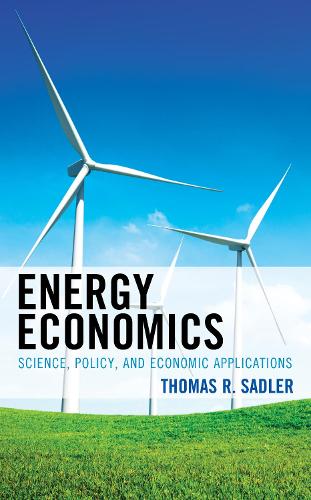
Energy Economics: Science, Policy, and Economic Applications
(Hardback)
Publishing Details
Energy Economics: Science, Policy, and Economic Applications
By (Author) Thomas R. Sadler
Bloomsbury Publishing PLC
Lexington Books
13th January 2020
United States
Classifications
Professional and Scholarly
Non Fiction
Central / national / federal government policies
333.79
Physical Properties
Hardback
378
Width 160mm, Height 229mm, Spine 33mm
748g
Description
Energy Economics: Science, Policy, and Economic Applications explains energy systems from an economics perspective. Specifically, the author uses the tools of economics to analyze the development of modern energy systems, the worlds reliance on fossil fuels, and the components of a transition to cleaner energy resources. He also considers the science and policy underlying important energy issues, especially with respect to nuclear energy and the climate crisis, arguing that, without changes to the worlds fossil fuel consumption patterns, an increase in demand for energy will exacerbate environmental problems. This reality demonstrates the importance of the book's analysis of primary energy sources, energy supply and demand, and energy systems. Energy matters are fundamental to our way of life; yet, when it comes to energy economics, many people do not have a working vocabulary.
Reviews
Focusing on climate change and related policies, Sadler (Western Illinois Univ.) analyzes energy markets and systems and evaluates the usefulness of individual energy resources. Part 1 provides an understanding of the basics of energy economics, part 2 concentrates on traditional energy resources (oil, coal, natural gas, nuclear), and part 3 examines challenges to policy that controlling climate change presents. Sadler points out that the energy system comprises six sectors--electricity generation, power sources, fuels, buildings, industry, and transportation--and reminds readers that gains in energy efficiency across these sectors require changes in technology and human behavior. Addressing the climate change problem requires getting away from fossil fuels and learning to produce electricity with natural gas and renewables, and Sadler observes that credibly taking on climate change demands clean energy transformation. . . the book covers topics in energy economics sensibly and will serve as a useful resource for readers seeking an introductory treatment of this subject. Summing Up: Recommended. Lower-division undergraduates through faculty; professionals.
Author Bio
Tom Sadler is professor of economics at Western Illinois University.
